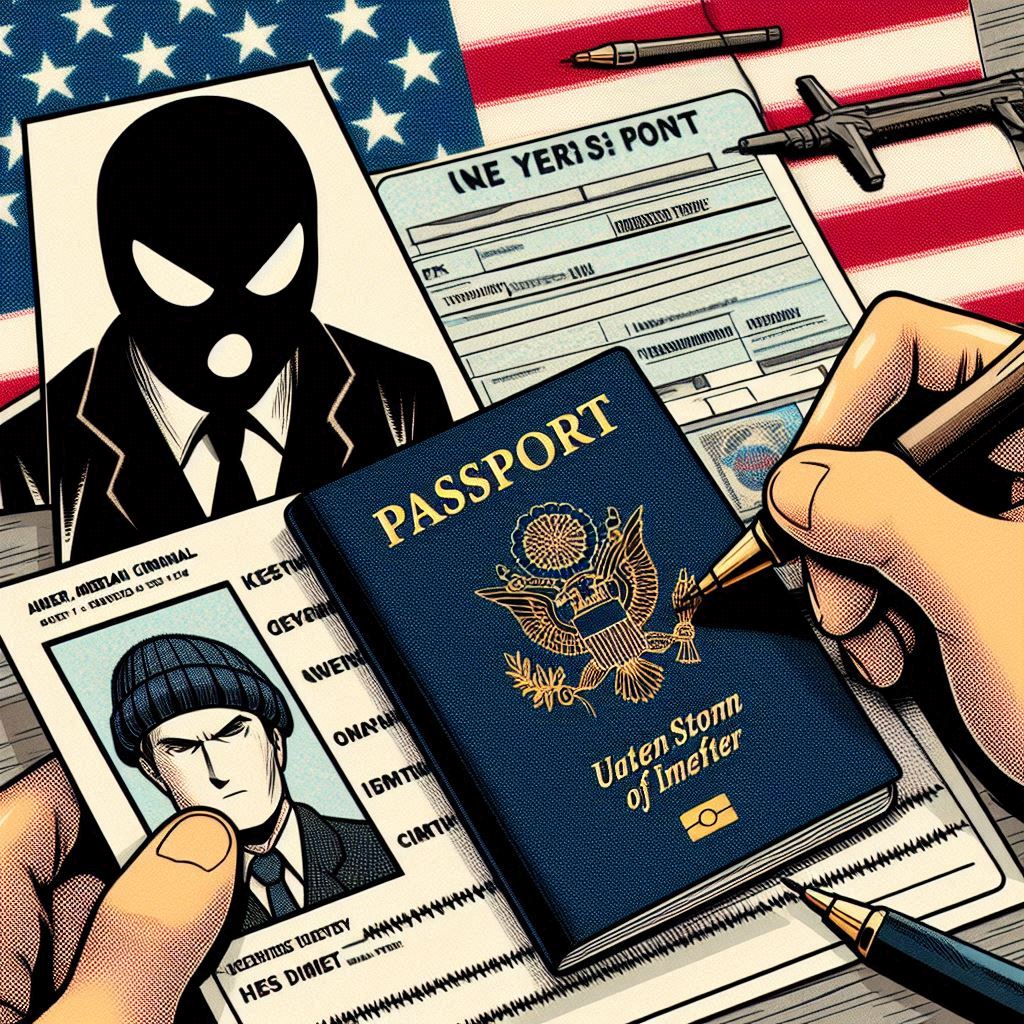
Amicus International Consulting Issues Warning on Thailand’s Growing Black Market for Identity Documents and Urges Public to Seek Legal Alternatives
VANCOUVER, British Columbia – As passport fraud and illegal identity trafficking escalate across Southeast Asia, Amicus International Consulting is sounding the alarm on Bangkok’s booming underground trade in forged and stolen identity documents.
From fake passports and birth certificates to altered national IDS and biometric forgeries, Thailand’s black market has become a global hub for illicit travel and identity crime.
The issue is no longer confined to local syndicates. Increasingly, this underground economy is exploited by international fugitives, human traffickers, and criminal networks seeking to bypass immigration controls, launder money, or flee prosecution.
Amicus International Consulting, a global leader in lawful identity solutions, urges the public to avoid these illegal avenues and instead pursue second passports, name changes, and relocations through legal and secure pathways.
Thailand’s Underground Passport Market: A Global Concern
Bangkok, long known for its status as a regional transit and tourism hub, has become a hotspot for illegal document production. In particular, its crowded side streets, counterfeit shops, and cybercafés have been linked to dozens of passport forgery rings uncovered by Interpol and Thai immigration police.
These criminal groups advertise their services via encrypted messaging apps, dark web marketplaces, and even coded posts on social media platforms. They offer counterfeit documents from countries including the United States, Canada, Germany, Japan, and Australia—often claiming they are either honest (stolen) or “undetectable” fakes.
In truth, the overwhelming majority are crude forgeries easily flagged by immigration systems. And possession or use of such documents is a serious crime.
Case Study 1: The 2014 Malaysian Airlines MH370 Mystery
In one of the most high-profile cases involving forged passports in Thailand, two Iranian nationals boarded Malaysia Airlines Flight MH370 using stolen Italian and Austrian passports purchased in Bangkok.
The incident raised global alarm over Thailand’s document fraud market. Although terrorism was eventually ruled out in that case, the incident spotlighted Bangkok as a central hub for forged identity documents.
Case Study 2: 2023 Bangkok Interpol Raid
In August 2023, Thai and international authorities arrested a Vietnamese-led syndicate in the Bang Na district that had produced and sold over 5,000 fake passports. The documents—sold primarily to Middle Eastern, Chinese, and African buyers—included forged visa stamps and biometric chips. The group reportedly earned over $2 million annually.
Several buyers used the documents to apply for work permits, open bank accounts, or enter countries under false names. Upon arrival, many were detained by biometric checks, and several were deported or charged under false identity and immigration fraud statutes.
Case Study 3: West African Cybercriminals in Thailand
Between 2022 and 2024, Thai police dismantled multiple fake passport rings operated by West African cybercrime syndicates. These networks used Bangkok as a base to forge EU and U.S. passports for use in romance scams and international bank fraud. The buyers often paid in cryptocurrency and received documents via courier disguised as business letters or commercial packaging.
The Legal Risk of Buying a Passport in Thailand
Amicus International warns that even “possessing” a fake or stolen passport—regardless of its use—is grounds for arrest in Thailand and other countries. Under Section 265 of the Thai Penal Code, forging or using a false document carries up to 20 years in prison, especially if the document is a passport or government ID.
Further penalties may apply under immigration laws or anti-terrorism statutes. Foreigners caught with false passports may be:
- Deported and blacklisted
- Detained without bail
- Charged with national security offences
- Denied future immigration opportunities globally
In addition, foreign embassies routinely cooperate with Thai authorities in identifying and prosecuting nationals involved in document fraud.
A Magnet for Fugitives, a Threat to Global Security
Thailand’s passport black market has attracted scammers and individuals fleeing justice across borders.
In recent years:
- A Chinese billionaire under anti-corruption investigation was caught with two fake Dominican and Cypriot passports bought in Bangkok.
- A Pakistani national sought for terrorism financing was found living in Chiang Mai under a forged Swedish identity.
- A Nigerian scammer who defrauded U.S. citizens of $5 million was extradited after being captured in Pattaya using a forged Portuguese passport.
These incidents highlight how fake identity documents obtained in Bangkok can threaten global immigration systems, banking security, and national intelligence frameworks.
Why Individuals Turn to These Markets
The reasons for seeking false identity documents vary widely. Some are refugees fleeing persecution, others are criminals avoiding arrest, but many are ordinary individuals—business owners, political dissidents, debt defaulters, or people with complicated travel histories—who feel trapped by their national identity or visa restrictions.
“In desperation, people search for quick fixes, thinking a forged passport is the answer. But that choice can destroy their lives permanently,” said an employee of Amicus International Consulting.
The Safer Alternative: Legal Identity Change and Second Citizenship
Amicus International Consulting offers legal and secure solutions for those needing a new start. Instead of risking arrest and fraud, clients can apply for legitimate identity services, including:
- Second Passports via Citizenship by Investment (CBI) in Grenada, Dominica, Turkey, St. Kitts & Nevis, and others
- Name and Identity Changes through lawful petition and government registration
- Right of Blood and Ancestral Citizenship Applications
- Political Asylum or Safe Country Relocation
- Residency and Tax Planning Services
Case Study: Dissident From Myanmar Finds Legal Protection
After the 2021 military coup in Myanmar, a political activist fled to Thailand and sought refuge. She considered buying a fake European passport to travel to Canada. Fortunately, she contacted Amicus International instead. With expert legal counsel, she was granted residency in a Caribbean nation and received citizenship via investment within eight months.
Case Study: Chinese Businessman Trapped by Sanctions
A Chinese technology executive blacklisted under U.S. sanctions traveled to Thailand using his Chinese passport but was denied financial services abroad. After nearly purchasing a fake EU passport in Bangkok, he contacted Amicus. He re-established his global financial presence through a legal name change and CBI route in Dominica.
Thailand’s Law Enforcement Crackdown
Despite ongoing efforts, the black market in Bangkok remains persistent. Thai authorities—backed by Interpol and U.S. Homeland Security—have ramped up surveillance, undercover operations, and tech-enabled passport detection at all airports. New biometric scanners now make it nearly impossible to use forged travel documents at Thai borders.
“Using a fake passport today is like playing with fire,” the Amicus employee added. “Biometric checks, e-chip scanning, and machine-readable zones mean you’ll be caught—often within seconds.”
Public Advisory: How to Spot a Scam
Amicus offers the following public safety tips for anyone considering alternative identity services:
- Avoid websites or vendors offering ‘black passports,’ diplomatic credentials, or biometric alterations.
- Never send cryptocurrency to anonymous Telegram or Signal contacts for document services.
- Don’t be fooled by vendors showing ‘proof of work’ or photos of real passports—they’re often stolen.
- If it’s not government-issued through a formal process, it’s almost certainly illegal.

Why Amicus?
Amicus International Consulting provides expert legal services in over 45 countries. With more than 15 years of experience and a client base ranging from corporate executives to journalists and privacy advocates, Amicus delivers:
- ? Confidential client handling
- ? Legal compliance with international law
- ? Biometric-secure documentation
- ? Global relocation planning
- ? Financial privacy and asset protection
“The world is watching Bangkok. And law enforcement is catching up,” said the Amicus representative. “We encourage individuals to avoid the dark path of forged identities and explore the many legal doors available. Amicus is here to help.”
? Contact Information
Phone: +1 (604) 200-5402
Email: [email protected]
Website: www.amicusint.ca








